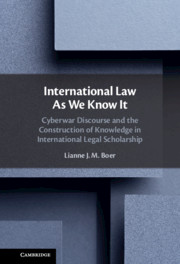 International Law As We Know It
International Law As We Know It Book contents
- International Law As We Know It
- International Law As We Know It
- Copyright page
- Contents
- Acknowledgments
- 1 Knowing International Law
- 2 “Legal Problem-Solution” and the Cyberwar Discourse
- 3 “Not ‘Armed Force’ in the Literal Sense”
- 4 “The Greater Part of Jurisconsults”
- 5 “Call Me Again If You’re Ever Ready to Begin Answering the Questions”
- 6 In Conclusion: International Law As We Know It
- Appendix Chapter 5
- Bibliography
- Index
1 - Knowing International Law
Published online by Cambridge University Press: 01 October 2021
- International Law As We Know It
- International Law As We Know It
- Copyright page
- Contents
- Acknowledgments
- 1 Knowing International Law
- 2 “Legal Problem-Solution” and the Cyberwar Discourse
- 3 “Not ‘Armed Force’ in the Literal Sense”
- 4 “The Greater Part of Jurisconsults”
- 5 “Call Me Again If You’re Ever Ready to Begin Answering the Questions”
- 6 In Conclusion: International Law As We Know It
- Appendix Chapter 5
- Bibliography
- Index
Summary
This chapter puts forward the main point of the book: to propose a new “way of seeing” (Johns) international legal scholarship. One of its principal claims is that a focus on the ‘microlevel’ of international legal scholarship changes our understanding of what it means to make law. This has significant implications for what we scrutinize and how; for what we think matters to the way international legal knowledge comes about and what it is we do as legal scholars. What it entails is an “attentiveness” (Orford) to the particular, individually spoken and written word, as well as to the part played by the individual scholar who utters it. The introduction roughly outlines the cyberwar discourse, but mostly situates the book in scholarship about doctrine as well as scholarship about the (socio)linguistics of academic knowledge construction. It also details how it takes up Anne Orford's call for a “turn to description” and relates that turn to practice theory, linguistics and ethnographic work on and in international law.
- Type
- Chapter
- Information
- International Law As We Know ItCyberwar Discourse and the Construction of Knowledge in International Legal Scholarship, pp. 1 - 25Publisher: Cambridge University PressPrint publication year: 2021


